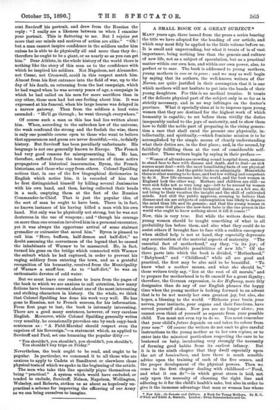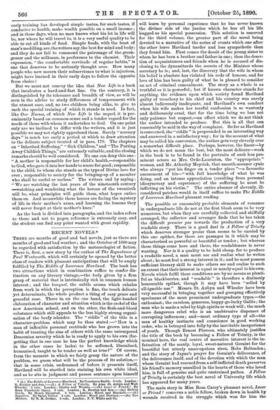A SMALL BOOB ON A GREAT SUBJECT.•
MANY years ago, there issued from the press a series bearing the title we have adopted for the heading of our article, and which may most fitly be applied to the little volume before us. It is small and unpretending, but what it treats of is of vast importance, being nothing less than the genesis and culture of new life, not as a subject of speculation, but as a practical matter within our own ken, and within our own power, also, to perfect or to mar. The book is addressed to young mothers, young mothers in ease or in posse ; and we may as well begin by saying that its authors, the well-known writers of Our Nurses, are quite justified in their assumption that it is one which mothers will not hesitate to put into the hands of their young daughters. For this is no medical treatise. It treats of the delicate physical part of the subject only in so far as is
strictly necessary, and in no way infringes on the doctor's province. What it specially aims at is to impress upon young women that they are destined for the highest work of which humanity is capable; to set before them vividly the duties inseparably united to the joys of maternity, and to show them how to fulfil the noble part of preparing in the rising genera- tion a race that shall excel the present one physically, in- tellectually, and spiritually,—which feminine mission is to be accomplished by the simple means of clearly understanding what their duties are, in the first place ; and, in the second, by faithfully fulfilling them at the cost of considerable self- sacrifice. These writers begin by saying in their preface :—
" Women of all ranks are crowding round hospital doors, anxious to stand face to face with disease and death, and to deal—as sick nurses must deal—with the most humiliating facts of our physical and moral nature. And the public looks on admiringly. Meanwhile there is other nursing to be done, and but few willing and competent to do it. New life streams into the world, and the best women in England look the other way. Mothers and children are still—as were sick folks not so very long ago—left to be nursed by women who, even when trained in their technical duties, as a few are, do not bring to their vocation the insight and the skill of cultivated minds. And still the public approves, seeming to believe that disease and sin are subjects of contemplation less likely to deprave the mind than life and its genesis ; and that the young woman in whose arms God places the new-born babe is the one person in the world who ought to know nothing about it till it comes 1" Now, this is very true. But while the writers desire that young women should be taught something of what in all probability lies before them, and also what they could do to assist others if brought face to face with a sudden emergency when skilled help is not at hand, they especially deprecate any accentuation of the material aspects of maternity. "The essential fact of motherhood," say they, "is its joy ; of infancy, the illimitable possibilities of new life." Of the
three parts into which the book is divided, " Motherhood," "Babyhood," and Childhood," while all are good and practical, the first may be also said to be beautiful. " Te know what a mother means, and what she should be," these writers truly say, " lies at the root of all morals," and
to prepare for motherhood is to fit oneself for a great dignity ; therefore, the German expression, in der Hoffnung, more fitly designates than do any of our English phrases the happy time when the young mother is looking forward to an advent that is to be not merely her own greatest joy, but also, she hopes, a blessing to the world. " Hitherto your brain, your nerves, your instincts, your organs and their functions, have served yourself alone. Now you are no longer alone ; you cannot even think of yourself as separate from your possible child. You must not even try to do so. You must remember that your child's future depends on and takes its colour from your now." Of course the writers do not omit to give careful instructions to the young mother as to her own regime, or to enter into the minutest particulars respecting the care to be bestowed on baby, inculcating very strongly the necessity of forming good habits from its earliest infancy. But it is in the ninth chapter that they dwell especially upon. the art of homieuliure, and here there is much sensible
advice upon the training of each of the five senses, and the proper development of the physical powers. Then we come to the first chapter dealing with childhood—" Food, and what it can do "—in which great stress is laid, not only upon the necessity of choosing the right line and adhering to it for the child's health's sake, but also in order to give it the immense advantage that man or woman has whose
• New Life : its Genesis and Culture. A Book for Young Mothers. By H. C. O'Neill and Edith A. Barnett. London : Swan Sonnenschem and Co.
early training has developed simple tastes, for such tastes, if conducive to health, make wealth possible on a small income ; and in these days, when no man knows what his lot in life will be, nor where he will travel to, it is a very useful quality to be able to eat all kinds of food. Simple foods, with the least of man's meddling, are, thewriters say, the best for mind and body; and they do not fail to commend the patronage of the green- grocer and the milkman, in preference to the chemist. Their expression, " the comfortable servitude of regular habits," is one that deserves to be seriously thought over. How many people who now mourn their subservience to what is injurious, might have learned in their early days to follow the opposite from choice !
But we must not convey the idea that New Life is a book that inculcates a hard-and-fast line. On the contrary, it is distinguished by its tolerance and breadth of view, as will be seen in the advice to study differences of temperament with the utmost care, and, no two children being alike, to give to each the special training of which it stands in need. In fact, like Our Nurses, of which New Life is the sequel, it is pre- eminently based on common-sense and a tender regard for the needs of those with whom it undertakes to deal. On one point only are we inclined to differ with the writers, and it is just possible we may not rightly apprehend them. Surely " nursery days" is much too early a period at which to draw attention to the delicate subject treated of in para. 170. The chapters on " Inherited Suffering," " Sick Children," and " The Putting Away Childish Things," are extremely valuable, and the closing remarks should be well considered. No one can deny this one : "A mother is responsible for her child's health,—responsible to God, who gave it into her hands to nurse for good ; responsible to the child, to whom she stands as the type of Divine love for ever ; -responsible to society for the bringing-up of a member who shall be useful or useless." The writers end by saying : " We are watching the last years of the nineteenth century —watching and wondering what the heroes of the twentieth will be, what principles will guide them, what hopes entice them on. And meanwhile these heroes are facing the mystery of life in their mother's arms, and learning the lessons they will never forget at their mother's knee."
As the book is divided into paragraphs, and the index refers to these and not to pages, reference is extremely easy, and the student can find any point wanted with great rapidity.







































 Previous page
Previous page